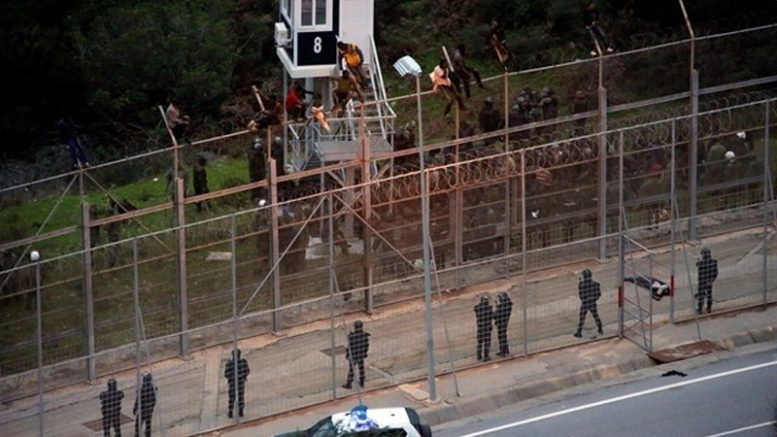Spain’s Interior Ministry has confirmed that work to remove the controversial razor-wire that tops border fences separating Morocco from the Spanish North African cities of Ceuta and Melilla will begin by end-November, with the wire to replaced with other materials and an increase in height of the fence so as to cause less serious injuries while still deterring migrants from scaling the border fence to reach Spanish territory.
The removal of the concertina razor wire from the border fences has long been a demand of non-governmental organizations working to protect the rights of immigrants and refugees. After the Socialist government of President Pedro ánchez came to power in May 2018, one of the first priorities for the North African borders outlined by the new Interior Minister Fernando Grande-Marlaska was the replacement of the razor wire with a less-harmful deterrent.
► News Sources: El País and Europa Press …
According to the ministry, the work on the fences will last ten months and will cost nearly 18 million euros in total, with 8.3 million euros to be spent on the fence at Ceuta and another 8.5 million euros at Melilla. The project to remove the razor wire marks the first time in 13 years that any work has been carried out on the fences separating the North African Spanish cities from Morocco.
Spanish news reports say that Spain and the government of Morocco have reached agreement to increase security along the border fences while the work is underway.
In recent months, Spain has implemented a number of new security measures at Ceuta and Melilla, including a new closed-circuit TV system along the border at Ceuta that includes 66 cameras, 14 of which use thermal technology to detect incursions along the fence. At the same time, Spain has put in place facial recognition systems at the Ceuta border post of El Tarajal and at the Melilla border posts of Beni Enzar, Chinatown, Mariguari and Farhana.
► Click to read more news about Immigration & Refugees in Spain …
Check out more news from Spain about:
► Animal Welfare ► Corruption/Transparency ► Discrimination ► Education ► Elections ► Environment & Sustainability ► Fair Trade & Development Aid ► Healthcare ► Historical Memory ► Housing & Homelessness ► Human Rights ► Labour & Unemployment ► LGBT+ ► Peace & War ► Politics ► Poverty ► Refugees & Migration ► Technology & Social Enterprise ► Women’s Rights

All images at ProgressiveSpain.com are the copyright of their respective authors/owners and are reproduced here for non-commercial, journalistic purposes in accordance with Fair Use doctrine. All other content is Copyright © 2015-2019 ProgressiveSpain.com and is licensed under a Creative Commons Attribution-NonCommercial-ShareAlike 4.0 International License.

